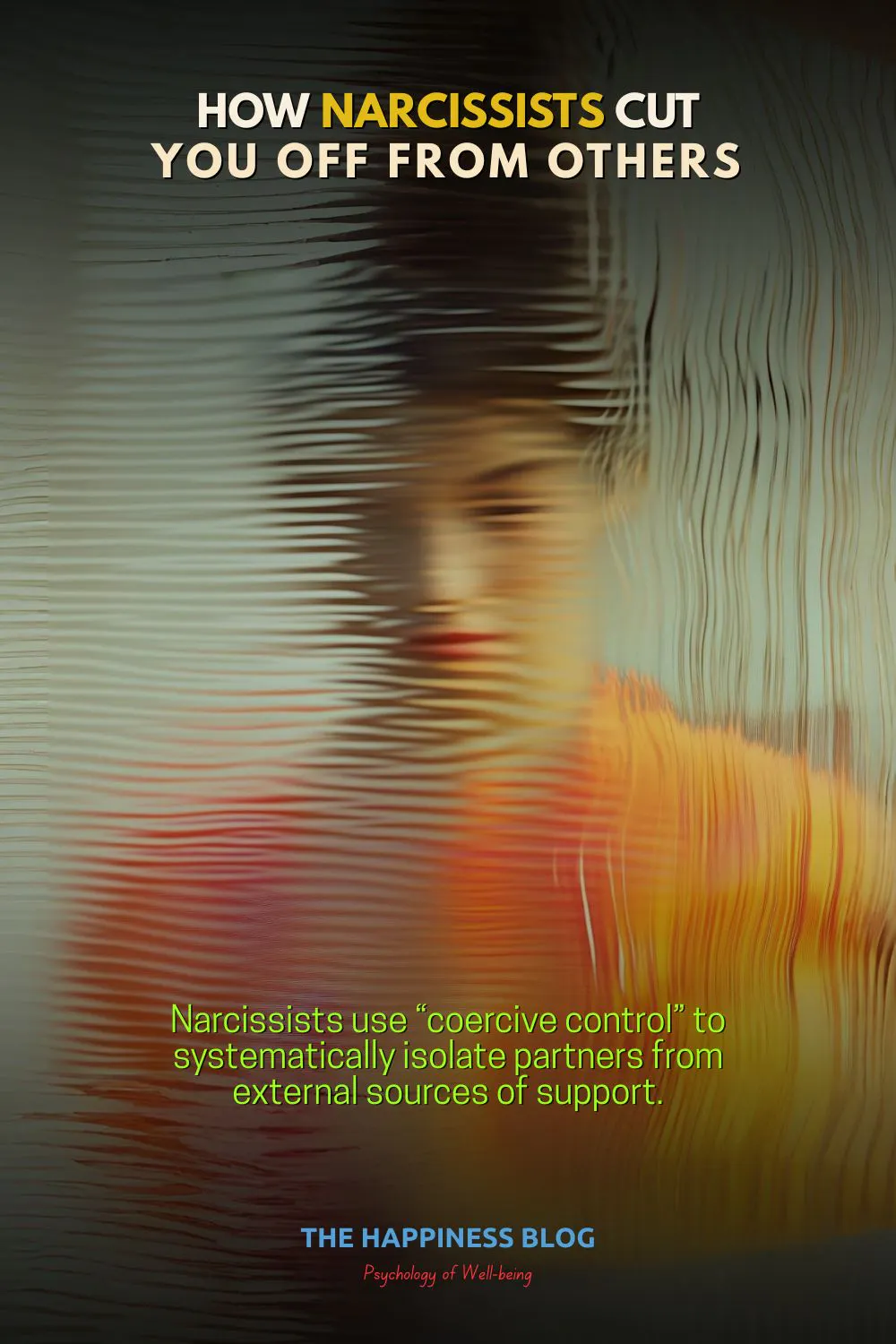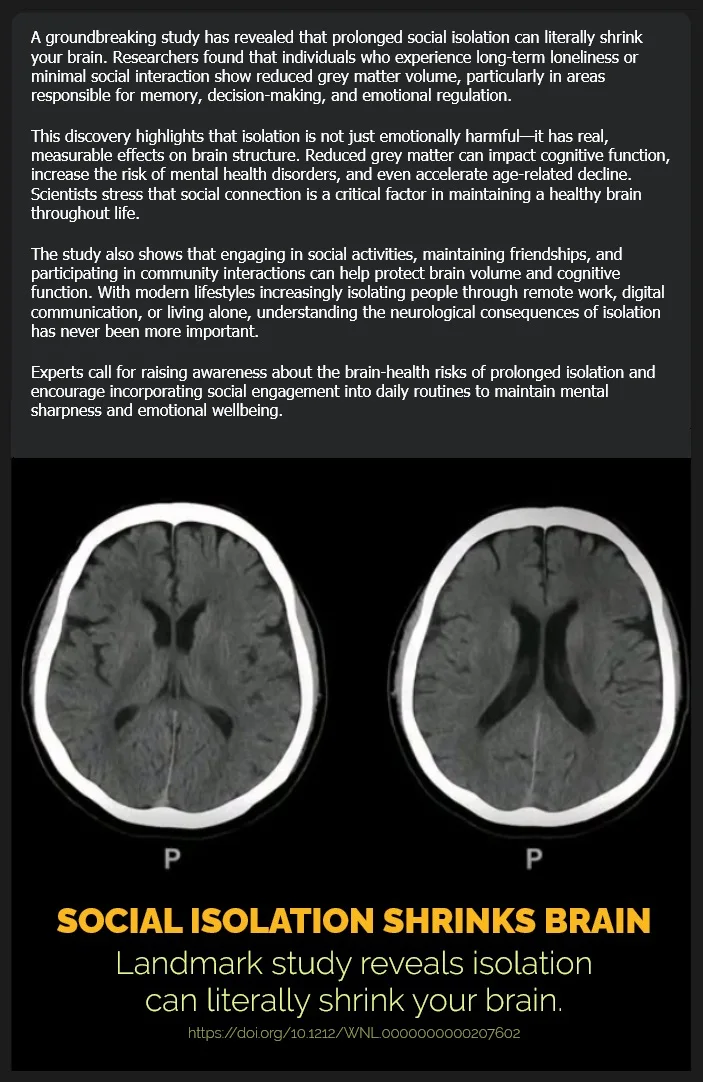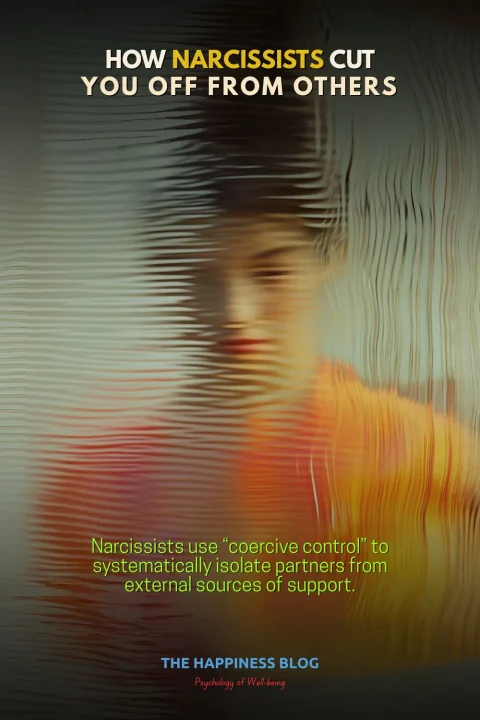Today's Sunday • 9 mins read
Your friends stopped calling. Family visits feel tense. Somehow, the person who claims to love you the most has become your only connection to the world.
This isolation didn’t happen overnight, and it’s not your fault. Narcissists are known to socially isolate their partners from others.
Narcissistic men use a pattern of behaviors called coercive control to subjugate women, including relationship abuse, intimidation, resource control, and social isolation.
Coercive control within intimate relationships refers to an ongoing pattern of behaviors which, taken together, serve to dominate, undermine, and restrict the freedom of an individual. — Evan Stark, Coercive Control: How Men Entrap Women in Personal Life (2007)
7 Ways Narcissists Isolate You From Your Loved Ones
Narcissists rarely start with overt control. Their subtle tactics seem harmless, or even loving, at first.
They gradually isolate you from your friends, family, and professional network. The goal is to make you totally dependent on the narcissist for validation, support, and connection.
This is how they isolate you:
- They Weaponize Jealousy Over Your Other Relationships
- They Discourage You From Attending Social Events
- They Track Your Messages And Conversations
- They Plant Doubts About People You Trust
- They Use Triangulation and Flying Monkeys
- They Reframe Themselves As The Victim
- They Impose Financial Control

1. They Weaponize Jealousy Over Your Other Relationships
A narcissist frames jealousy as proof of love: “I love you so much that I’m jealous when you’re with anyone else.”
They question why you need other people when you have them. They suggest that your friendships are threatening the intensity of your relationship.
They dress up this possessiveness as romantic devotion: “Don’t you want to spend time with me? I thought we were building something special.”
Actually, the narcissist is sending a message that choosing others means rejecting them, and your other relationships as betrayals.
Over time, this manufactured jealousy extends to everyone in your life:
- Your close friend becomes “too flirty.”
- Your sibling is “always causing drama.”
- Even your therapist might be accused of “turning you against” your partner.
Ultimately, you feel guilty for maintaining outside connections and move away from your support system.
Find out How Jealous You Are: A Quick Check!
2. They Discourage You From Attending Social Events
A narcissist rarely forbids you from seeing people. Instead, they create emotional consequences that make socializing feel impossible.
They pick fights right before you leave for events. They sulk dramatically when you return. They even make you recount every conversation and justify every laugh.
They schedule competing plans without consulting you, then express wounded confusion: “I thought you’d want to spend time with me. I guess I was wrong about what matters to you.”
Actually, the narcissist is teaching you that socializing comes with a price. You will be punished with silent treatment, emotional withdrawal, coldness, or accusations when you get home.
Ultimately, you decline invitations before they can become battles. Friends stop reaching out. Your social circle shrinks.
And all this without any explicit prohibition from the narcissist. You bowed out under the steady weight of knowing what awaits you if you go to your college reunion, friend’s birthday party, or an annual family gathering.
3. They Track Your Messages And Conversations
Your narcissist demands, reasonably enough, “We shouldn’t have secrets.” So you hand over your phone password, social media logins, and email access.
They frame it as building trust. Then surveillance starts.
Your location gets tracked “for safety.” Text threads get read while you’re in the shower. Messages from friends disappear without explanation, or worse, get answered by someone pretending to be you.
The real damage isn’t the intrusion itself. It’s how you adapt to constant monitoring.
You stop typing honest thoughts to your sister. You avoid telling your friend what’s really happening at home.
Every conversation gets filtered through an invisible audience of one. You become a curator of your own communications. You say or write only what won’t trigger suspicion or interrogation.
The privacy that normal relationships require is gone. And with it is gone your ability to ask for help or advice from anyone outside the relationship.
4. They Plant Doubts About People You Trust
Your narcissistic partner subtly erodes your trust in the people closest to you.
They meet your best friend and gush about how wonderful she is. Then two weeks later: “I don’t know, there’s just something odd about her that I can’t put my finger on.”
“Did your brother seem kind of cold to you today?” or “Your coworker mentioned your promotion in a weird tone; did you catch that?”
They say your family is toxic, your friends are using you, or your coworkers are jealous of you. But the comments come as observations, not accusations, that stick in your mind like splinters.
Meanwhile, they’re running a parallel smear campaign you don’t see. Your support system gets primed to doubt you.
Mutual friends hear falsified stories about your “aggressive displays,” “distressed speaking,” or “unpredictable conduct.”
When you need someone to talk to, you find the narcissist has already poisoned the relationships. You are now left truly alone.
5. They Use Triangulation and Flying Monkeys
Triangulation occurs when narcissists bring third parties into relationship disputes to validate their perspective and further isolate you.
The narcissist might recruit mutual friends, family members, or new romantic interests to side against you, creating a coalition that reinforces your sense of being wrong or difficult.
These recruited allies, called “flying monkeys,” do the narcissist’s bidding by confronting you on their behalf, spreading gossip, or monitoring your activities.
Flying monkeys often believe they’re helping resolve disputes or supporting a friend in need, unaware they’re participating in an abuse tactic.
This manipulation extends the narcissist’s control beyond direct interaction, making you feel surrounded by judgment and lacking safe spaces to process what’s happening.
5. They Reframe Themselves As The Victim
Narcissists love to play the victim card. They show themselves as the perpetually wronged and forever hurt to get your sympathy.
They tell emotionally moving stories of cheating exes, toxic friends, and selfish relatives who abandoned and betrayed them.
These hurt-one narratives serve three purposes:
- It makes them look too innocent to have devised any devious tactic.
- It explains why the narcissist needs constant reassurance.
- It justifies their controlling behavior as self-protection.
When you spend time with others, they may claim to feel abandoned or unimportant. They might say they had a terrible day and desperately needed you, making your absence feel like a moral failure.
This emotional manipulation transforms routine social activities into acts of cruelty against your partner.
You begin prioritizing their feelings over your own needs, believing that a good partner would sacrifice their social life to ease their partner’s insecurity.
7. They Impose Financial Control
Your narcissist seizes control of your finances and resources, forcing you to ask them for money. They do this to limit your mobility and choices and deepen your dependence.
At first, they may discourage or sabotage your work, saying they want to “take care of you” or blaming job stress for your health concerns. Then they manufacture disputes on workdays, so you miss shifts or perform poorly.
They demand that you report every expense, but hide their own finances. Then they call your purchases unnecessary and cut your access to funds, so you can’t leave, go out, or seek help without permission.
This happens across income levels: even wealthy partners of narcissists face outrage and demands to justify their independent purchases.
Leaving a narcissist without financial independence is exponentially harder.
Did you know that isolation can shrink your brain? This study on 8,896 participants found that social isolation is linked to a reduction in brain volume, particularly in areas associated with memory and dementia.
Brain Effects of Social Isolation

Psychological Effects of Social Isolation
Being isolated with a narcissistic partner severely harms their target’s mental health, suggests research.
- A meta-study found links between coercive control and PTSD and depression (Lohmann, 2023).
- A study of six female partners of narcissistic men found they experienced intensified abuse, worse mental health, and greater dependence on abusers (Musacchio, 2025).
Four ways coercive social isolation can affect one’s mental well-being:
1. Collapse of The Support System
The cutting off from friends, family, and professional support leaves the person without an outside perspective or a way to verify reality.
This lets the abuser’s version of events become the only truth, increasing confusion, anxiety, loneliness, depression, and physical health risks.
The people who could help are gone. Worse, the emotions of fear and shame often leave them isolated and less likely to seek support (Johnson, 2020).
2. Erosion of Individual Identity
The narcissist abuser dismisses or mocks hobbies, interests, and friendships until they vanish.
Ultimately, they abandon their loved activities and adapt to the abuser’s demands.
Their former identity erodes, and they no longer recognize themselves.
3. Intense Trauma Bonding
Trauma-bonding forms when the more powerful partner treats the vulnerable one to alternating cycles of unpredictable cruelty and brief warmth.
The narcissist intensifies trauma bonding in isolated victims. This creates neurochemical dependence, making them crave approval from the person who harms them.
4. Extreme Difficulty Leaving
Loss of finances, social support, and self‑identity produces entrapment. Leaving feels impossible.
However, research shows that those who drew on spiritual beliefs and support networks were more likely to leave their abuser (Musacchio, 2025).
Final Words
Social isolation by coercive control is a form of partner abuse.
If you feel you have lost touch with your social support after meeting your narcissist partner, realize that the isolation is due to your partner’s need for control over you, not any flaw in you.
Reconnect with your trusted people and reach out to relationship abuse resources to break the isolation, even when it feels impossible to escape.
√ Also Read: The Fragile Narcissist: Covert Form of Narcissism
√ Please share this if you found it helpful.
» You deserve happiness! Choosing therapy could be your best decision.
...
• Disclosure: Buying via our links earns us a small commission.
